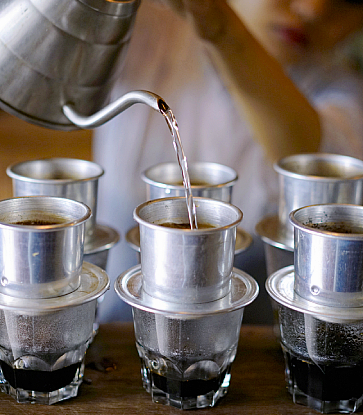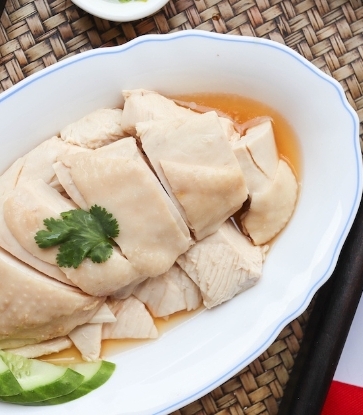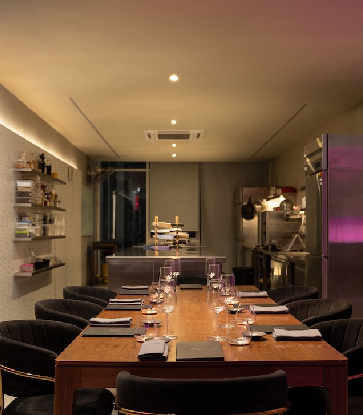When he opened Haoma in 2017, Chef Deepanker Khosla knew he wanted to do things differently.
Long before sustainability became a buzzword, he had removed nearly all plastics from his one MICHELIN Star and the first MICHELIN Green Star (MICHELIN Guide Thailand 2023) restaurant in Bangkok, even plastics from suppliers.
Then, he took his efforts a step further, installing a unique aquaponics system in the restaurant’s backyard, where he captures rainwater, raises fish, and tends to an on-site organic garden.
More recently, he introduced a sustainability centre and textile recycling programme.
Now, Thailand’s sustainable fine-dining forerunner is setting his sights on one of the few frontiers he hasn’t fully addressed yet: drinks.

While food often steals the limelight when discussing sustainability initiatives, a restaurant’s beverages can produce an equally sizable, if largely unseen, carbon footprint. Now, stalwart chefs and restaurateurs in Thailand like Khosla are beginning to tackle the damage that drinks can create.
In the foyer of his light-dappled townhome-turned-restaurant on Sukhumvit Soi 31, guests soon will be able to belly up to a bar called Soma, “which will be driven by our ethos of sustainability,” says Khosla.
Spent ingredients and scraps, as well as market finds and local spirits, will feature in six low-waste tiki cocktails designed by Vishvas Sidana, Haoma’s director of food and beverage.
“We are also cooking our cocktails, by which I mean we are [applying a chef’s mindset] to the way we use a lot of elements in the restaurant and making our ingredients go further,” Khosla explains.
Cordials made from discarded tomato peels and seeds. Coconut water infused with lemon rinds. Homemade bitters fortified with garden-grown vegetable roots, spices and leftover citrus peel.
“The circular system that we run in the restaurant – we’re taking it one notch further,” says Khosla.
The impact of repurposing waste ingredients can be hard to quantify, but it isn’t difficult to assess the toll that drinks take on the planet.
According to data provided by EcoSpirits, a company new to the Bangkok food and beverage market that has developed a closed-loop distribution system to slash packaging waste in the premium spirits supply chain, 689 billion single-use glass bottles were produced by the beverage industry in 2020.
The climate costs don’t end at packaging.
Shipping, fertilisers, processing, and more can add an unseen carbon footprint to beer, wine, and cocktails. UK catering company Alliance Online calculated that one piña colada amounts to 690 grams of carbon dioxide released into the atmosphere – about the same as driving five kilometres.
To reduce his footprint further, Khosla is looking outside the box. “Repurposing spent ingredients is the starting point. Packaging is essential for us. We’re discussing not using any glassware [at Haoma and Soma], but only serving drinks in recycled wine bottles, for example,” he says.

Other restaurants, including fellow MICHELIN Green Star recipients PRU and Jampa in Phuket, have applied a similar approach.
PRU Chef Jim Ophorst has also turned kitchen scraps into cocktail components. “Citrus fruits mainly used for their skin in the kitchen are sent to the bar to be used for the juice,” he says. “But also, for example, leftover vanilla pulp can be infused in a syrup, vegetable cuttings can be used in drinks, and so on.”
What can’t be used in the kitchen or behind the bar doesn’t get tossed into the trash bin, however. Ophorst says that scraps that have reached the end of the road go to the Pru Jampa farm, about 20 minutes away “to become our compost, which in the end will be fertiliser for the farm.”
The PRU team has also paid particular attention to their relationships with suppliers. Ophorst and Sommelier Chalong Songkroh serve sustainable, organic, natural, and biodynamic wines from producers who share their ethos. And make world-class wines, of course, ranging from sparkling and orange natural wines to port.

“In our wine pairing, we want to showcase small organic wineries from across the globe to let our guests discover something new and rare,” explains Ophorst.
The rarer the wine label, the less likely it is that customers will order it, however, and so restaurants typically offer certain wines only by the bottle. But Ophorst and Songkroh have found a workaround with the Coravin system. This tool allows wine to be poured without removing the cork, and it has enabled Songkroh to serve rare wines by the glass and order fewer bottles.
For restaurants like PRU, the Coravin system helps to lower both shipping and carbon expenditures. And saving money, in many ways, can drive sustainability initiatives, according to David Hartwig, the head chef of the modern Swiss restaurant and one MICHELIN Starred IGNIV in Bangkok.
“We use the Coravin system for wine because it’s just financially not sustainable otherwise. And it’s such a good tool. We would be foolish not to use it,” he says.
But that isn’t the only cost- and carbon-cutting measure IGNIV has enacted. In fact, the restaurant’s sustainability initiatives started with something far more obvious.
“We don’t import water – we have a filtration system. That’s the first thing we knew we didn’t want to do,” he says. “And water is included in the menu price, so you don’t have to pay extra for it.”
IGNIV also rotates its cocktail menu seasonally. This subtle but important decision incentivises partner farmers to focus on nature’s regular cycle, rather than growing products out of season. Plus, using local, in-season goods keeps prices down, which allows the restaurant to keep standards high.

Rather than sacrificing quality, as Hartwig is quick to point, staying local and seasonal enables chefs like him to be creative, finding great, if less heralded, producers and working closely with them.
For example, IGNIV has collaborated with a boutique rum producer in Nonthaburi, to produce signature digestifs using Thai herbs and fruits. Instead of importing schnapps from Switzerland, Hartwig can now serve exclusive products guests won’t find elsewhere, with a local touch to boot.
PRU has followed a similar approach.
“We work with a coffee producer who has created a special Thai coffee blend for our coffee service, and we work with different tea makers, who produce 100% Thai and organic tea,” says Ophorst.
While developing relationships with trustworthy local suppliers has enabled these restaurants to add value to the customer experience, Hartwig believes that any discussion of sustainability in the food and beverage industry must involve one often overlooked element: employees.
“For me, sustainability doesn’t start with green labels, or even the beverages you drink or food you eat. It’s about the people who make it. It’s about the salaries, the education – all of that,” he says.
At IGNIV, he has developed training programmes with other restaurants in Bangkok, including Cadence by Dan Bark, Wana Yook and Elements, Inspired by Ciel Bleu, so that employees can understand how food, drinks, service, and operations work elsewhere. The goal, he says, is to give Thai workers a leg up in their careers.
“We talk about food, we talk about beverages, and that is always about gaining knowledge. But there are a lot of things people working in the industry in Thailand don’t know, even if they went to school for it,” says Hartwig. “It’s very important to keep that conversation going, to keep learning.”






















